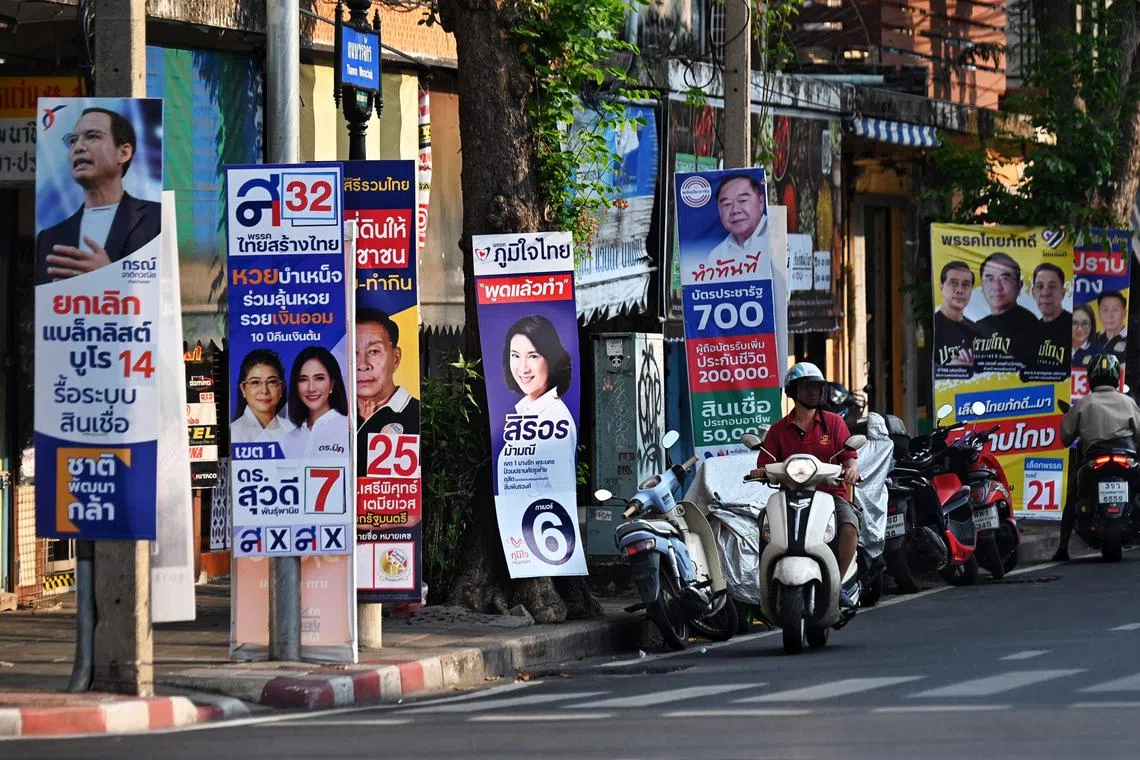All you need to know about the Thai election on May 14
Sign up now: Get insights on Asia's fast-moving developments

Campaign posters for the upcoming general election lining a street in Bangkok on April 20.
PHOTO: AFP
BANGKOK - Thailand will head to the polls on Sunday,
The general election is set to be a showdown
Here’s all you need to know about the election:
1. Second election since 2014 coup
Thai Prime Minister Prayut Chan-o-cha dissolved Parliament on March 20
The previous election was in 2019.
In 2023, more than 6,000 candidates from nearly 70 political parties will be contesting for 500 seats in Parliament’s Lower House.
There are more than 52 million eligible voters across Thailand’s 77 provinces. The authorities expect a record turnout of about 80 per cent of eligible voters.
2. Who wants to be prime minister
Mr Prayut, 69, is hoping to return to the premiership
Deputy Prime Minister Prawit Wongsuwan, 77, is also vying for the premiership as the PPRP’s nominee.
But popularity polls show both former army chiefs lagging behind
Also on Pheu Thai Party’s ballot for prime minister is property development tycoon Srettha Thavisin, 60, and party strategist Chaikasem Nitisiri, 74.
Move Forward Party leader Pita Limjaroenrat, 42, is his party’s candidate for prime minister and has also been faring well in opinion surveys.
Other candidates competing for the prime minister post include those from the incumbent coalition, like Bhumjaithai’s Mr Anutin Charnvirakul
3. Pheu Thai versus Prayut
The election is set to be a showdown mainly between two parties – incumbent Prime Minister Prayut’s UTN and opposition front runner Pheu Thai, an offshoot of Thaksin’s defunct Thai Rak Thai Party.
Since rising to power after staging the 2014 coup, Mr Prayut and other pro-military bodies have sought to limit the influence of Thaksin and his associated political parties.
Although Mr Prayut has parted ways with the military-backed PPRP, he retains the support of the conservative establishment.
Thaksin, 73, lives in self-imposed exile in Dubai
The former leader’s allegedly populist policies and growing influence in the early 2000s had been seen as a challenge to Thailand’s entrenched royalist political factions. He was accused of corruption and crony capitalism.
Thaksin-linked parties have won the most seats in every election since 2001, but their governments were ousted by military coups in 2006 and 2014.
With Ms Paetongtarn at the helm of Pheu Thai’s election campaign
4. New two-ballot system
A total of 500 seats in Parliament’s Lower House will be up for grabs. They comprise 400 constituency seats and 100 party-list seats
Each voter will get two slips at the ballot box, one to vote for a candidate running in their local constituency and another to choose their preferred political party on a national level.
The 400 constituency seats will be given to candidates who win the most votes in each district.
And the 100 party-list seats will be distributed proportionately to political parties based on their share of votes nationwide.
The polls will close on Sunday at 5pm local time (Singapore 6pm) and unofficial results are expected by 11pm the same day, said the Election Commission.
Official results must be released within 60 days of the vote, or by July 13.
5. Forming the government and choosing the PM
To form the government, a party or a group of parties will need to win at least 251 of the 500 Lower House seats.
This process could take weeks or months, depending on the results and negotiations between parties, especially if the outcome warrants a coalition government.
Parliament, which is made up of the Lower House and the 250-member junta-appointed Senate, will then take a joint-vote to choose the PM. This vote is likely to happen in or before August.
Only parties that have won at least 25 seats can enter their nominees for prime minister in the parliamentary ballot.
The PM candidate with at least 376 votes will head the government.
Assuming that a candidate has the entire Senate on his side, he will only need 126 votes from elected MPs to win the premiership.
The Senate, which in the 2019 election voted overwhelmingly in favour of Mr Prayut as prime minister, could pose a challenge to other parties vying for the premiership.
6. Bread-and-butter issues are key focus
Bread-and-butter issues feature prominently in campaign promises, as inflation and high household debt have weighed down Thailand’s post-pandemic economic recovery.
Most parties are promising welfare programmes, like increments to the minimum wage and pension payouts, debt suspension and price guarantees for agricultural goods.
Already under scrutiny is Pheu Thai’s eye-grabbing election promise to pay 10,000 baht (S$390) through a digital wallet to each citizen aged 16 and over. Critics are calling it extreme populism.
The state of democracy has become a focal point for those in the opposition camps who are against military intervention in politics.
But Mr Prawit, whose PPRP led the outgoing coalition government, is pitching himself as a force for political reconciliation
Rewriting the current 2017 junta-backed Constitution is one of the key election promises that anti-coup parties like Move Forward and the Thai Sang Thai party, led by veteran politician Sudarat Keyuraphan
7. First election since youth protests
All eyes will be on how Thailand’s younger generations vote
The movement sparked significant change in Thai political discourse, giving rise to discussions over the reform of strict lese majeste laws that protect the royal institution from insult.
However, only the Move Forward Party, which is popular among younger voters, has been clear in its commitment to pushing for amendments in this area
Other parties have mostly stayed clear of the issue.
The largest proportion of votes will lie with those aged below 42. This group makes up a little over 40 per cent of the 52 million, with Gen Z (aged 18 to 26) accounting for about 13 per cent and Gen Y (aged 27 to 42) constituting about 29 per cent.
The Gen X (aged 43 to 58) group makes up one-third of the electorate.
Together, the Baby Boomer generation (aged 55 to 77) and the oldest age group, the Silent Generation (aged 78 to 98), make up about 26 per cent.
A recent survey by Rangsit University, which polled those aged 18 to 26, showed that the Move Forward’s candidate, Mr Pita, topped young voters’ choice for the next prime minister, with 29.2 per cent of respondents’ support.
Pheu Thai’s Ms Paetongtarn came in second with 23 per cent support, and UTN’s Mr Prayut scored just 3.3 per cent.
8. Mr Prayut’s two-year limit
The current Constitution imposes an eight-year term limit on any individual serving as premier. Under these rules, Mr Prayut can only remain as the Prime Minister for two more years.
The former coup leader came to power as the head of a junta government in 2014 after overthrowing the Pheu Thai administration.
And while opponents argued that Mr Prayut’s term ended in 2022 and sought to have him removed last year, the Constitutional Court ruled that his term count only started in 2017, when the current Constitution was enacted.
If he returns as prime minister after the 2023 election, Mr Prayut said that UTN party leader Pirapan Salirathavibhaga will succeed him in the remaining two years he is barred from the premiership.



